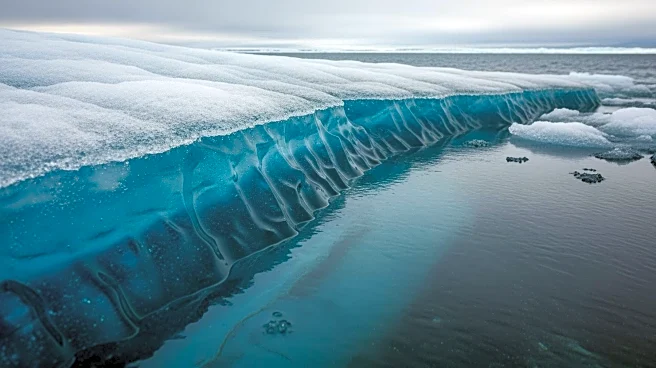What's Happening?
A recent study published in Nature Geoscience has documented the fastest ice loss ever recorded in Antarctica, specifically at the Hektoria Glacier. The glacier, located on the Eastern Antarctic Peninsula, lost eight kilometers of ice in just two months
during 2023. This rapid retreat is attributed to the glacier's position on an ice plain below sea level, which facilitated the detachment of large ice portions. The study, led by the University of Colorado Boulder and co-authored by Swansea University, highlights the potential for similar collapses in other vulnerable glaciers, which could significantly impact global sea level rise.
Why It's Important?
The unprecedented speed of Hektoria Glacier's retreat serves as a warning for potential future events in Antarctica. If similar conditions occur in larger glaciers, the rate of global sea level rise could accelerate, posing a threat to coastal communities worldwide. The study emphasizes the need for ongoing monitoring and international cooperation to better understand and predict changes in Earth's frozen regions. The findings underscore the importance of addressing climate change and its impact on polar ice sheets, which are critical to maintaining global sea levels.
What's Next?
Researchers are now focusing on identifying other glaciers with similar vulnerabilities to Hektoria Glacier. The study calls for increased monitoring efforts and international scientific collaboration to track changes in Antarctica's ice sheets. This could involve deploying more satellite and seismic technology to detect grounding lines and ice shifts. The findings may also influence policy decisions regarding climate change mitigation and adaptation strategies, as governments and organizations seek to address the potential consequences of accelerated sea level rise.
Beyond the Headlines
The rapid retreat of Hektoria Glacier highlights the complex interplay between geological features and climate change. The glacier's position on an ice plain made it particularly susceptible to ocean-driven forces, raising questions about the stability of other glaciers in similar settings. This event also underscores the importance of understanding the geological and environmental factors that contribute to ice loss, which could inform future research and conservation efforts.














